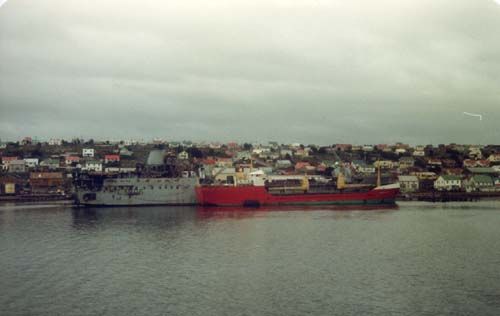 |
An incident at Fitzroy on June 8th was the worst single incident involving the Task Force during the Falklands War. At Fitzroy, to the southwest of Port Stanley, the bombing of ‘Sir Galahad’ and ‘Sir Tristram’ left 54 men dead and 46 injured.
‘Sir Tristram’ and ‘Sir Galahad’ were anchored waiting to offload their cargo – mainly Welsh Guard Infantry soldiers (on ‘Sir Galahad’) and their equipment (on ‘Sir Tristram’).
A Royal Marine officer based onshore, Major Ewan Southby-Tailyour, was concerned about Argentine observation posts that were known to be nearby. He took landing craft out to the ships and urged the Welsh Guards to get on land as soon as was possible.
Without warning at 17.15 – ‘Action Stations’ was piped as the planes were attacking – bombs from A4 Skyhawks landed on ‘Sir Tristram’. Almost immediately, the ship was filled with smoke.
At 17.35, two Mirage aeroplanes attacked – ‘Sir Galahad’ was the primary casualty of this attack. A bomb exploded in the ship’s ammunition hold and caused a huge explosion. The soldiers on board would have been at the mercy of the flames on board the ship. Many of those injured suffered serious burns wounds. It is probable that many more Welsh Guards would have been injured if it had not been for the skill of nearby Sea King helicopter pilots who took their helicopters over the deck of ‘Sir Galahad’ despite the exploding ammunition on board to allow their winchmen to pick up the injured. When life rafts were seen drifting back towards to burning ‘Sir Galahad’, some pilots took their helicopters to nearly sea level to use the wash from their rotor blades to drive the life rafts away from the ship.
The Welsh Guards were meant to have been part of the final drive on Port Stanley – however, the attack effectively knocked out their ability as a fighting unit as so much of their kit had been lost.
Many reasons have been forwarded as to why the ships and therefore the Welsh Guards had so little protection or warning against an attack. Some of the reasons are as follows but almost certainly a combination of events led to the devastating attack.
A Rapier battery had been set up to cover the anchor point but its electronics were not working by the time the attack took place – a similar experience to those who manned the Rapiers at San Carlos Bay.
Another reason given is that the helicopters that were going to be used to land the men from the ships (as opposed to the far more time consuming landing craft whose use depended on sea conditions) had been lost when the ‘Atlantic Conveyor’ had been hit by an Exocet missile. At the time when the Royal Marine officer urged the Welsh Guards to leave their ships as quickly as possible (about midday), he was told that the sea conditions made the use of the landing craft very difficult especially as some were carrying ammunition.
Another more controversial reason is that the government, fearful of more naval losses after all the ships that had been lost at San Carlos, ordered that there were to be no more. Therefore, the decision, on the back of this command, was that ‘Sir Galahad’ and ‘Sir Tristram’ were to sail to Bluff Cove without a naval escort. While there is no proof that a frigate or destroyer would have prevented the attacks, any Argentine observation intelligence sent back to base stating that both ships had no escort would have made both RFA ships a more tempting target. The skill of the pilots in the Argentine Air Force as witnessed at San Carlos Bay probably would have meant that some of the attacks would have got through. However, a Royal Naval escort might have made the Argentine high command think twice about ordering the attacks, especially in view of how the war was going at that moment in time.
One other issue that caused discussion at the time and after was whether that attack by either the Scots Guards at Mount Tumbledown or the involvement of the Welsh Guards was strategically required. Authors such as Hugh Bicheno have stated that the attacks by the Parachute Regiment and the Royal Marines aided by the gunfire of the Royal Navy were more than sufficient to defeat the Argentine forces on the Falklands and that the involvement of the Guards regiments were more a consequence of inter-military rivalry as opposed to any form of strategic value.
